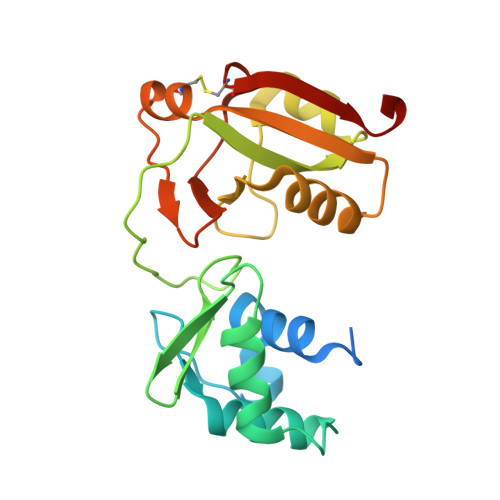Structural basis for Tpt1-catalyzed 2'-PO 4 transfer from RNA and NADP(H) to NAD.
Jacewicz, A., Dantuluri, S., Shuman, S.(2023) Proc Natl Acad Sci U S A 120: e2312999120-e2312999120
- PubMed: 37883434
- DOI: https://doi.org/10.1073/pnas.2312999120
- Primary Citation of Related Structures:
8TFI, 8TFX, 8TFY, 8TFZ, 8TG3, 8TG4, 8TG5, 8TG6 - PubMed Abstract:
Tpt1 is an essential agent of fungal and plant tRNA splicing that removes an internal RNA 2'-phosphate generated by tRNA ligase. Tpt1 also removes the 2'-phosphouridine mark installed by Ark1 kinase in the V-loop of archaeal tRNAs. Tpt1 performs a two-step reaction in which the 2'-PO 4 attacks NAD + to form an RNA-2'-phospho-(ADP-ribose) intermediate, and transesterification of the ADP-ribose O2″ to the RNA 2'-phosphodiester yields 2'-OH RNA and ADP-ribose-1″,2″-cyclic phosphate. Here, we present structures of archaeal Tpt1 enzymes, captured as product complexes with ADP-ribose-1″-PO 4 , ADP-ribose-2″-PO 4 , and 2'-OH RNA, and as substrate complexes with 2',5'-ADP and NAD + , that illuminate 2'-PO 4 junction recognition and catalysis. We show that archaeal Tpt1 enzymes can use the 2'-PO 4 -containing metabolites NADP + and NADPH as substrates for 2'-PO 4 transfer to NAD + . A role in 2'-phospho-NADP(H) dynamics provides a rationale for the prevalence of Tpt1 in taxa that lack a capacity for internal RNA 2'-phosphorylation.
- Molecular Biology Program, Memorial Sloan Kettering Cancer Center, New York, NY 10065.
Organizational Affiliation:


















